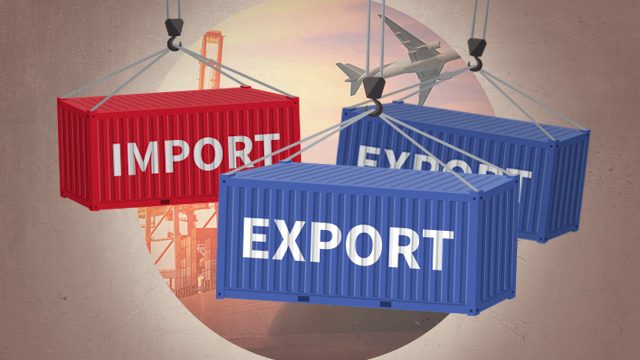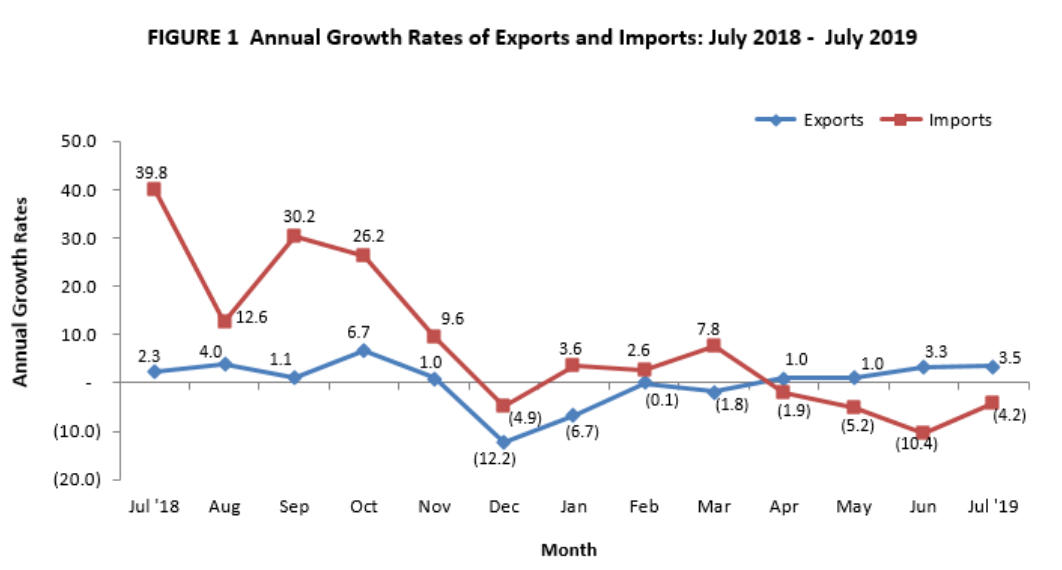SUMMARY
This is AI generated summarization, which may have errors. For context, always refer to the full article.

MANILA, Philippines– The National Economic and Development Authority (NEDA) urged government agencies to further strengthen relationships with key trading partners, as the Philippines’ total external trade declined by 1.3% in July 2019.
The Philippine Statistics Authority (PSA) reported that the country’s total external trade in goods in July reached $15.74 billion. Of the total external trade, $6.17 billion or 39.2% were exported goods and $9.57 billion or 60.8% were imported goods.
Exports slightly improved by 3.5%, while imports dropped by -4.2%. This narrowed the country’s balance of trade to $3.39 billion, 15.5% lower than the $4.02 billion trade deficit recorded in the same month last year.
A trade deficit means that imports exceeded the country’s exports.

Eight of the top 10 major export commodities of the country registered gains.
The top exports were gold (81.8%), fresh bananas (34.6%), machinery and transport equipment (23.9%), and electronic equipment and parts (18.9%).
“Philippine exports remained resilient during the 2nd quarter of 2019 despite the continuing external challenges such as trade tensions between the [United States] and China, the bleak outlook in Europe, and the uncertainty of the future of Brexit,” said Socioeconomic Planning Secretary Ernesto Pernia.
Meanwhile, 9 of the top 10 major import commodities dropped.
Declines were led by iron and steel (-35.8%); mineral fuels, lubricants, and related materials (-14.5%); transport equipment (-12%); telecommunication equipment and electrical machinery (-2.4%); and industrial machinery and equipment (-1.5%).
Merchandise imports declined by 4.2% due to lower payments for raw materials and intermediate goods as well as mineral fuels, lubricants, and related materials.
Pernia said the effects of the long-standing trade tensions between the US and China are beginning to show and global manufacturing sentiment continues to falter.
“The country’s manufacturing sector is expected to sustain its growth despite the overall decline in global manufacturing. We are optimistic as we see a reduction of global oil prices, the recent cuts in electricity rates, and the lower import costs due to the appreciation of the peso,” said Pernia.
He also underscored the importance of addressing issues in the Philippine agriculture sector.
“As the country continues to pursue programs that will pave the way for the resurgence of the manufacturing sector, increasing the competitiveness of agricultural producers, particularly rice farmers, should continue to be prioritized,” said Pernia. – Rappler.com
Add a comment
How does this make you feel?
There are no comments yet. Add your comment to start the conversation.